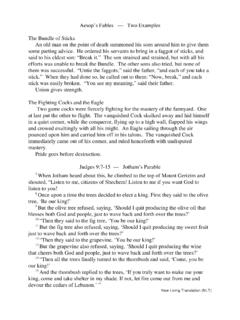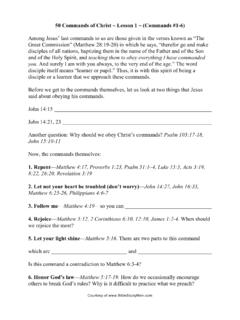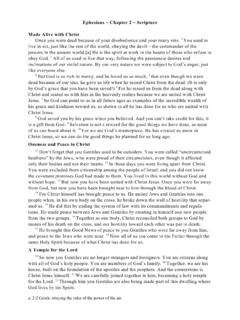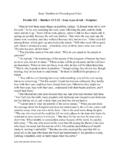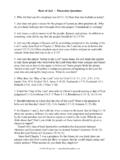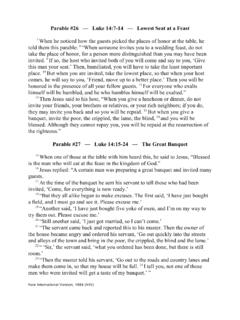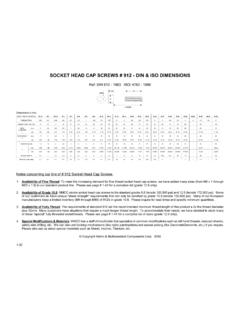Transcription of Jesus’ Parables in Chronological Order Parable #32 ~ Luke ...
1 jesus Parables in Chronological OrderParable #32 ~ Luke 16:1-8 ~ The Shrewd Manager ~ ScriptureJesus told his disciples: There was a rich man whose manager was accused of1 wasting his possessions. So he called him in and asked him, What is this I hear2 about you? Give an account of your management, because you cannot be managerany longer. The manager said to himself, What shall I do now? My master is taking3 away my job. I m not strong enough to dig, and I m ashamed to beg I know4 what I ll do so that, when I lose my job here, people will welcome me into theirhouses. So he called in each one of his master s debtors.
2 He asked the first, How5 much do you owe my master? Eight hundred gallons of olive oil, he The manager told him, Take your bill, sit down quickly, and make it fourhundred. Then he asked the second, And how much do you owe? 7 A thousand bushels of wheat, he replied. He told him, Take your bill and make it eight hundred. The master commended the dishonest manager because he had acted8 shrewdly. For the people of this world are more shrewd in dealing with their ownkind than are the people of the light. I tell you, use worldly wealth to gain friends9 for yourselves, so that when it is gone, you will be welcomed into International Version (NIV) Parable #32 ~ Luke 16:1-8 ~ The Shrewd Manager ~ Discussion Questions1.
3 Who is the audience for this Parable ? (Luke 15:1-2, 16:1)2. Who did the Rich Man s creditors think was being generous to them? Whywould the shrewd manager gain from lowering the bills of his master s creditors?3. After the manager lowered the bills, what choices did the master have?4. What does shrewd mean? Is it bad to be shrewd?5. What are some possible interpretations of this Parable , especially Verses 8-9?(Hint: there are at least 6 interpretations, perhaps more.)6. Is jesus commending dishonesty? (16:8)7. What is jesus saying about (or to) the children of the light? (16:8, Matt 10:16)8. Why is it so difficult to keep a proper perspective on money?
4 9. Is there some way that God wants you to change the way you handle yourresources? What resources do you have that you can use to help people in need?Courtesy of #32 Luke 16:1-18 Shrewd Manager Notes for Leader1. Who is the audience for this Parable ? (Luke 15:1-2, 16:1)From 15:1-2, we know that jesus has been speaking to tax collectors, sinners,Pharisees, and teachers of the [Jewish] law. To this audience is now addeddisciples, probably meaning jesus followers, not only the 12 apostles. LiteralBible translations (KJV, NKJV, etc.) add the word also before disciples. Andhe said also unto his (Young s Literal Translation).
5 Readers who don tlook at Luke 15:1-3 can find the Parable difficult, if not impossible, to Who did the Rich Man s creditors think was being generous to them? Whywould the shrewd manager gain from lowering the bills of his master s creditors?3. After the manager lowered the bills, what choices did the master have?4. What does shrewd mean? Is it bad to be shrewd?Is it bad to be shrewd? Not really. To be shrewd is to be keen witted, clever, ordiscerning in practical affairs. The dictionary equates shrewd to commonsense. It is a mistake to associate being shrewd with bad things, like being selfish,stingy, greedy, cunning, or hard What are some possible interpretations of this Parable , especially Verses 8-9?
6 (Hint: there are at least 6 interpretations, perhaps more.)First of all, the manager is not the master s servant or slave. He is a free manwith a high position of managing the rich man s extensive properties. He leasesthem out and collects yearly rents in the form of produce from the land. In thiscase, the amounts owed are very large. This suggests, says Leonard Fonck in thebook, Parables of the Gospel, that the farmers themselves probably sublet all orpart of these farms to sub-tenants (lower-level farmers and peasants). In addition,they had probably conspired with the manager in raising the rents. Much or all ofthe higher rent was actually going into the manager s pocket, not to the master.
7 Soit is easy to understand that the manager, after giving the farmers proof of hisfriendship, would hope for the return of theirs in the future. Thus the only personactually wronged was the rich landowner, but even that wrong is not so outrageousas would be cutting down an actual and proper one level the meaning of the Parable is straightforward enough, and isprovided by jesus himself: use worldly wealth to gain friends for yourselves. Many early church writers enlarge upon this and add that you should use youradvantages in this world to gain favor for yourself in the next. One says, When,therefore, any one anticipating his end and his removal to the next world, lightensthe burden of his sins by good deeds, either by canceling the obligations ofdebtors, or by supplying the poor with abundance.
8 By giving what belongs to theLord, he gains many friends, who will attest his goodness before the Judge, andsecure him by their testimony a place of happiness. There is no question that the Parable is confusing, since on the face of it Jesusappears to be commending dishonest behavior. Every commentary I ve looked atadmits this is a difficult passage to interpret. Here are a few theories as to why therich man commended his manager s actions:1) Equate dishonesty with being streetwise. In The Message, Eugene Petersontranslates Verses 8-9 as follows: Now here s a surprise: The master praised thecrooked manager! And why?
9 Because he knew how to look after people are smarter in this regard than law-abiding citizens. They are onconstant alert, looking for angles, surviving by their wits. I want you to be smart inthe same way but for what is right using every adversity to stimulate you tocreative survival, to concentrate your attention on the bare essentials, so you lllive, really live, and not complacently just get by on good behavior. 2) Some scholars believe the manager cut out the interest that was beingimproperly charged by the Rich Man. In those days, records of a loan weresometimes inflated in Order to get round the Judaic prohibition against usury (Deut23:19); thus a loan of four hundred gallons of oil might be written up as eighthundred, so that the loan would appear to be without interest.
10 The manager thusmight be reducing the loans to their original amount. This is not a goodexplanation because the debt is probably not a ) Others believe the manager eliminated his own commission. This would nothave affected the master negatively. The editors of the New Jerusalem Bible(Roman Catholic) state It was the custom for a steward to take a commission onall sales of his master s goods as this was his only means of making a salary. In thepresent case the original loan was presumably 400 gallons of olive oil and 800bushels of wheat. In reducing the debtors bills, he is not depriving his master ofanything, but only sacrificing his own immediate interests by forgoing hislegitimate [or usurious] commission.

